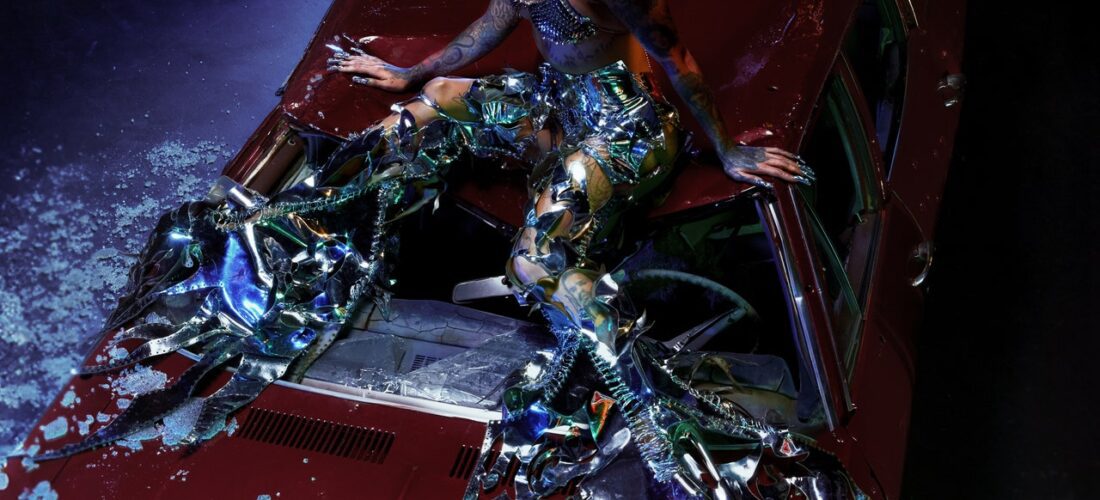Crash
On Kehlani’s last album, 2022’s blue water road, the L.A.-based singer-songwriter dove into the comforts of love via airy guitar pop. It was a slight adjustment to their formula following albums rife with heated R&B and moody atmosphere, a new wrinkle reflecting a maturing sensitivity to tales of love lost and won. On Crash, Kehlani’s fourth studio album, they turn once again, this time toward a grab bag of genres that reflect the dizzying ups and downs of desire and self-examination. While it often sounds like Kehlani is trying on a series of flashy outfits to see which one fits best, it’s still exhilarating when Crash dials up their signature swagger.
For Kehlani, the titular crash symbolizes a sudden, brief spike of emotion. The album evokes that intensity through freewheeling music that roves between styles, occasionally within the same song: buoyant dancehall, trap-inflected R&B, and country-tinged ballads are just a few of the flavors Kehlani whips up. Halfway through opener “GrooveTheory,” they switch from girl-group croons to stomping come-ons with the click of a radio dial. “Let’s make a movie/Then come and show me the sequel,” they purr, offering an easy inroad to Crash’s frisky point of view. On the similarly slow-burning “Sucia,” Kehlani gets an assist from Jill Scott, who shows up in sultry spoken-word mode, and Puerto Rican rapper Young Miko, who slides on the song’s beat with slinky ease. It’s a moody highlight that depicts Kehlani in the depths of lust: “I don’t want Miami, I want Medellín/Take you from the party to the trampoline,” they urge.
That focus on desire courses throughout most of Crash, lending its best songs a flirty levity. On “What I Want,” Kehlani threads a chip-tuned Christina Aguilera sample with trap hi-hats and thundering bass, giving it a darkened glower that ratchets up the bravado. It’s one of the stronger, more deliberate sample choices on Crash, fresher than much of the nostalgia bait that runs rampant in contemporary pop and R&B. “After Hours” achieves a similar flex, rewiring the riddim popularized by Nina Sky’s classic “Move Ya Body” into a breezy plea for a longer night with a lover; it’s a featherlight, upbeat reinterpretation that doubles as an expert showcase for Kehlani’s vocals, which across Crash sound more syrupy and relaxed than ever.
When Crash slows down, the results are more mixed. On the pared-back ballad “Better Not,” Kehlani reaches for a country-tuned wistfulness that treads too close to faceless folk-rock. “Vegas,” with its keening, ’80s-nodding guitar solos, suffers a similar fate and simultaneously falls into cliched songwriting (“What happens here stays here”) that winds up sounding like a marketing campaign. It’s emblematic of some of Crash’s less imaginative songs, like the “crying in the club” motif that runs through the chorus of the dancehall-tinged, Omah Lay-featuring “Tears.” The lyrics can feel like an afterthought, even when Kehlani’s sheer charisma and honey-smooth delivery makes them go down easy.
Kehlani recovers on “Deep,” a highlight that unfurls a spread of bass-heavy psych-rock to take stock of their tumultuous life story. Featuring background vocals from family including their daughter, the song recalls Rihanna’s cathartic, conflicted ANTI, with a careening chorus that rides on Kehlani’s trilling, emotive delivery and heavy, skull-rattling beats. Tracing an arc from sleeping on a concrete floor to present-day success, it’s the kind of sharp, introspective work that colors Kehlani’s best music: a welcome counter to some of Crash’s excesses.
All products featured on Pitchfork are independently selected by our editors. However, when you buy something through our retail links, we may earn an affiliate commission.
